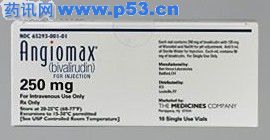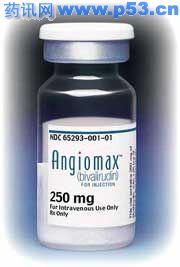通用名称为ANGIOMAX
比伐卢定250mg/vial;重组和稀释后静脉注射PWD。
法律分类:
接收
类药物为ANGIOMAX
抗凝血剂(凝血酶抑制剂)。
制造商的ANGIOMAX
中药公司
主治为ANGIOMAX
与阿司匹林:接受经皮腔内冠状动脉成形术(PTCA)在不稳定型心绞痛的抗凝。患者,或风险,肝素诱导的血小板减少症(HIT)和血栓形成综合征(HITTS)接受percutaceous冠状动脉介入(PCI),并在患者接受临时使用糖蛋白IIb / IIIa受体(GPI)的PCI。
成人剂量为ANGIOMAX
给予阿司匹林300 - 325mg每日:启动0.75毫克/公斤静脉推注(0.3毫克/公斤,5分钟后,如果需要的话可能会额外丸),由1.75毫克/公斤/小时的PCI过程的持续时间。五月继续输液至4小时后的程序;后4小时,可给予额外注入0.2毫克/公斤/小时至20小时,如果需要的话。肾损害:肌酐清除率<30毫升/分钟:降低输注速率为1毫克/公斤/小时;血液透析:0.25毫克/公斤/小时。
儿童剂量为ANGIOMAX
<18yrs:不推荐。
禁忌症为ANGIOMAX
活动严重出血。
为ANGIOMAX警告/注意事项
考虑停止,如果出现出血症状。与近距离治疗血栓形成的风险增加。与增加出血的危险性有关的疾病。怀孕(乙部件)。哺乳的母亲。
为ANGIOMAX的相互作用
与warfarin增加出血的危险,肝素,溶栓。
ANGIOMAX的不良反应
出血,背部疼痛,疼痛,头痛,胃肠不适,低血压或高血压,注射部位疼痛,尿潴留。
如何ANGIOMAX提供?
单用小瓶- 1
Angiomax® (bivalirudin)
for injection
Product Overview
Angiomax® (bivalirudin) is an anticoagulant currently approved in the US and other countries for use in patients undergoing coronary angioplasty procedures. Angiomax works by directly inhibiting thrombin, a key factor involved in the formation of blood clots, to help prevent clot formation during angioplasty.
The Medicines Company believes Angiomax will become the leading replacement for heparin in critical cardiovascular care. Heparin, an indirect thrombin inhibitor, was discovered almost 100 years ago and is a commonly used anticoagulant to treat arterial thrombosis. Angiomax has the potential to become a broadly applied intravenous anticoagulant in the treatment of arterial thrombosis.
Safety Considerations
ANGIOMAX with provisional use of glycoprotein IIb/IIIa inhibitor is indicated for use as an anticoagulant in patients undergoing percutaneous coronary intervention (PCI), and in patients with or at risk for heparin-induced thrombocytopenia and thrombosis syndrome (HIT/HITTS) undergoing PCI. ANGIOMAX is intended for use with aspirin and has been studied only in patients receiving concomitant aspirin. ANGIOMAX is contraindicated in patients with active major bleeding or hypersensitivity to ANGIOMAX or its components. The most common (10%) adverse events for ANGIOMAX were back pain, pain, nausea, headache, and hypotension. An unexplained fall in blood pressure or hematocrit, or any unexplained symptom, should lead to serious consideration of a hemorrhagic event and cessation of ANGIOMAX administration. Please see complete prescribing information.
Generic Name for ANGIOMAX
Bivalirudin 250mg/vial; pwd for IV inj after reconstitution and dilution.
Legal Classification:
Rx
Pharmacological Class for ANGIOMAX
Anticoagulant (thrombin inhibitor).
Manufacturer of ANGIOMAX
The Medicines Company
Indications for ANGIOMAX
With aspirin: anticoagulation in unstable angina undergoing percutaneous transluminal coronary angioplasty (PTCA). Patients with, or at risk of, heparin–induced thrombocytopenia (HIT) and thrombosis syndrome (HITTS) undergoing percutaceous coronary intervention (PCI), and in patients undergoing PCI with provisional use of glycoprotein IIb/IIIa (GPI).
Adult dose for ANGIOMAX
Give with aspirin 300–325mg daily: initiate 0.75 mg/kg IV bolus (may give additional bolus of 0.3 mg/kg after 5 min if needed), followed by 1.75 mg/kg/hr for duration of PCI procedure. May continue infusion up to 4hrs post-procedure; after 4hrs, may give additional infusion of 0.2 mg/kg/hr up to 20 hrs, if needed. Renal impairment: CrCl <30 mL/min: reduce infusion rate to 1 mg/kg/hr; hemodialysis: 0.25 mg/kg/hr.
Children's dosing for ANGIOMAX
<18yrs: Not recommended.
Contraindications for ANGIOMAX
Active major bleeding.
Warnings/Precautions for ANGIOMAX
Consider stopping if symptoms of bleeding occur. Increased risk of thrombus formation with brachytherapy. Diseases associated with an increased bleeding risk. Pregnancy (Cat. B). Nursing mothers.
Interactions for ANGIOMAX
Increased bleeding risk with warfarin, heparin, thrombolytics.
Adverse Reactions for ANGIOMAX
Bleeding, back pain, pain, headache, GI upset, hypo- or hypertension, inj site pain, urinary retention.
How is ANGIOMAX supplied?
Single-use vial—1



